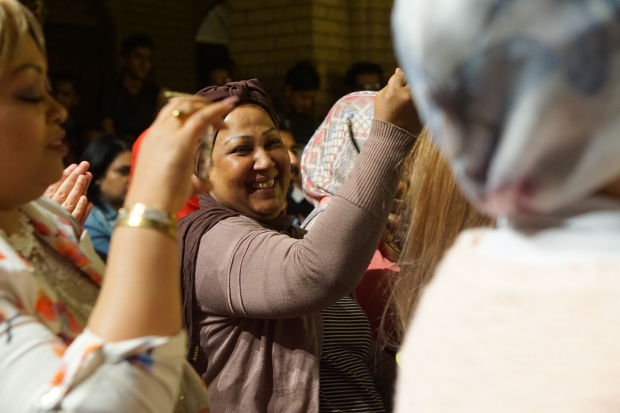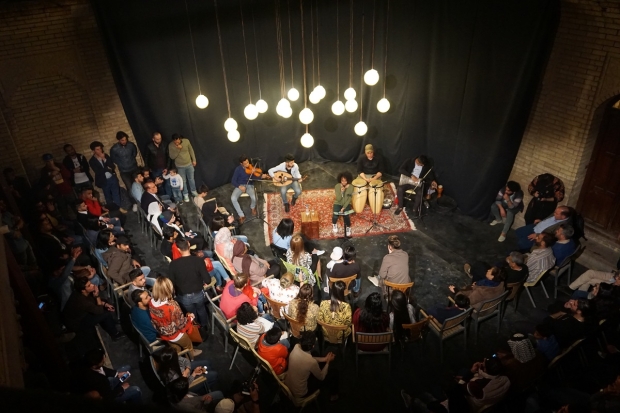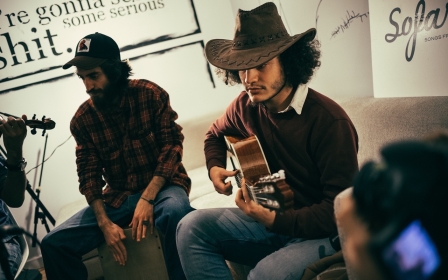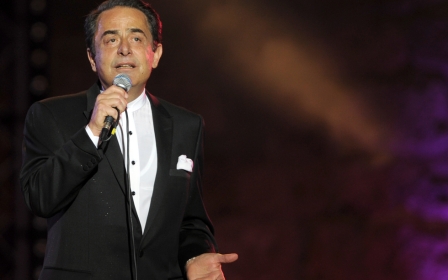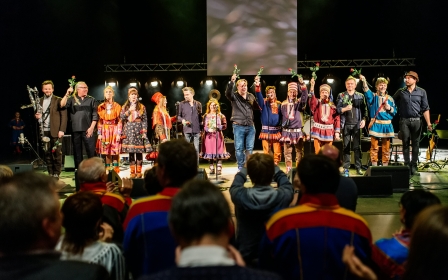Iraqi child singer flees Baghdad: 'I love Iraq, I don’t want to leave’
BAGHDAD - The sound of the cheering crowd echoes off the walls of a small, quaint theatre venue just off the banks of the Tigris river.
The venue was chosen for a farewell concert last month given by 13-year-old Tara Moneka, a child star of the MTV pan-Arab talent show The Voice Kids.
"I love Iraq, of course I don’t want to leave." The young Iraqi was forced to flee the country she called home as a refugee, after receiving threats from militiamen against her singing.
Standing tall while holding a bouquet of bright roses gifted to her by the audience, Tara's smile quivers in front of the applauding crowd. As the spotlight beams onto her, her eyes glisten as she courageously holds back tears. This is, after all, the last time she is to sing in front of her friends and family in her hometown.
“I love Iraq,” declared Tara, who is eloquent in her speech and mature in her thoughts for someone so young. “Of course I don’t want to leave," she added.
Tara and her family are now refugees in Turkey. They are gradually settling in and trying to create a new home away from Iraq, though leaving their homeland has been difficult.
The risk of music
Since the fall of Saddam Hussein in 2003, the widening security gap paved the way for other non-state armed groups, in the form of militias, to replace his iron-fist rule.
These militia often find their roots in religious groups, and by spreading fear they have successfully pushed music out of Baghdad’s culture by deeming it haram (forbidden). As a result, this has forced many to only enjoy music in the privacy of their own homes. Gone is the Iraq of the 1960s, where the likes of Duke Ellington would perform jazz in Baghdad.
The rising threats against musical institutions is precisely what led Tara and her family to flee Iraq. They never wanted to leave the city that was full of magical memories for them.
Tara, who in 2014 was featured on the pan-Arab talent show, The Voice Kids, and won over the judges, has a clear talent for music. Throughout the interview, she hums melodies to classical Arab musicians such as the legendary Egyptian singer Um Kulthum.
“I enjoy singing because I enjoy the happy reaction people give me when I sing,” said Tara.
Yet it was after her appearance on the show that the threats against Tara and her family began.
‘The militias don’t want Tara to sing’
- Salama, Tara Moneka’s mother
“The militias don’t want Tara to sing,” explained Tara’s mother, Salama, who is nicknamed "Auntie Salama" by most of Baghdad or "Mama" by close friends of the family.
Behind Salama’s smile, there was a sense of sorrow as she sat in her apartment once so proudly decorated with beautiful furniture, and now all sold off or packed away for the journey ahead.
“Our decision to leave Baghdad came after the New Years Eve concert,” where Tara was due to perform in front of Iraq’s National Theatre, recalled Salama.
As Tara took to the stage, some “militia members climbed onto the stage and forced the concert to shut down,” said Salama. “That’s when her father started receiving threats about Tara’s singing,” she added.
‘Militia members climbed the stage and forced the concert to shut-down’ - Salama, Tara’s Moneka’s mother
The militia members, who were of an unknown affiliation, switched off the stage lights and told Tara to run home and not return. State security forces were unable to protect the event that had been organised by the Baghdad council.Following the New Year’s Eve concert, a group of armed militants appeared at the family home with a more direct threat.
They told Tara's father Salah: “You need to teach your daughter Quran; if your daughter sings again, bad things will happen,” explained Salama, who is especially worried as they knew where the family lived.
In a separate incident, Salah was approached by militia dressed in black while he was at work. They told him to never allow his children to sing again. The family never discovered to which group the men belonged.
‘You need to teach your daughter Quran; if your daughter sings again bad things will happen’
- militia warning to Tara's father Salah
Threats are not new to the artistic family. Ahmed, Tara’s older brother, who is now residing in Canada, took the role of a gay character in a short film The Society while he was in Iraq. His performance won him a nomination for an award at the Toronto International Film Festival.
Upon his arrival in Canada, he received threats saying he would be killed if he ever returned to Baghdad. This forced him to apply for refugee status thousands of kilometres away from his home, family and beloved friends.
Tara explained how she “can’t do anything without her brothers”.
“My dream is to be able to reach my brothers,” she said.
With two now residing in Austria and one in Canada, she has not seen them since 2015.
In the future that awaits her, Tara wants to pursue a career in the music industry. The plan is to create a production company and record her first album.
Tara and the rest of her family want nothing more than to be able to express their art - free of threats.
“I want to be able to leave war,” explained Tara. “War is what has created fear."
Baghdad’s artistic past
For much of the world, the words Baghdad and art are not easily associated. In the minds of many, Baghdad conjures up images of war, violence, refugees, and even the most feared term post 9/11: terrorism.
This has not always been the case. For centuries, the words Baghdad and art were synonymous.
A final farewell
At Tara’s farewell concert where she leaves her last “imprint” on the city she loves, there is barely space to stand, let alone sit.
For security reasons, only close family and friends were invited, and Iraqi police forces loomed outside the venue for added protection.
‘I want to be able to leave war, war is what has created fear’
-Tara Moneka
The family had arranged to leave the country the next day. “We wanted to let Tara leave her signature on Baghdad,” explained Salama.
Tara performs a medley of patriotic Iraqi and Baghdad-related songs, though what most moves the crowd is when Tara sings the following verse: “If you love your country and its people.”
The crowd echoes Tara’s melodious singing.
As Tara left Iraq, she was gifted a song written and composed by Iraqi poets to always remember her country by.
"I will always be proud of my Iraqi heritage," said Salama via telephone, now in Turkey, where the forced departure has taken its toll on the family. "Since we've arrived here, we have been plagued with sickness."
New MEE newsletter: Jerusalem Dispatch
Sign up to get the latest insights and analysis on Israel-Palestine, alongside Turkey Unpacked and other MEE newsletters
Middle East Eye delivers independent and unrivalled coverage and analysis of the Middle East, North Africa and beyond. To learn more about republishing this content and the associated fees, please fill out this form. More about MEE can be found here.



